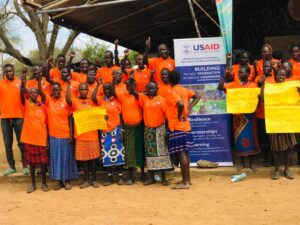DDS-NK ICAN community members participated in 16 Days of Activism
 The U.S. Agency for International Development is funding the Integrated Community Agriculture and Nutrition Activity. The project’s objective is to make vulnerable households more resilient. Diocesan Development Service – North Karamoja (DDS-NK) has been implementing the ICAN Activity in the Kotido district of the Karamoja Region since September 2020. The Integrated Community and Nutrition Activity (ICAN) in the district of Kotido in the Karamoja Region is being implemented by DDS-NK, the development arm of the Church of Uganda North Karamoja Diocese, in partnership with Abt Associates. The project is being funded by USAID.
The U.S. Agency for International Development is funding the Integrated Community Agriculture and Nutrition Activity. The project’s objective is to make vulnerable households more resilient. Diocesan Development Service – North Karamoja (DDS-NK) has been implementing the ICAN Activity in the Kotido district of the Karamoja Region since September 2020. The Integrated Community and Nutrition Activity (ICAN) in the district of Kotido in the Karamoja Region is being implemented by DDS-NK, the development arm of the Church of Uganda North Karamoja Diocese, in partnership with Abt Associates. The project is being funded by USAID.
The USAID/Uganda ICAN Project collaborates with community groups to improve economic opportunities for disadvantaged households, maintain their access to and consumption of a variety of nutrient-dense diets, and boost social capital by strengthening ties between formal governance structures and local communities. ICAN Activity’s four main goals are to increase the resilience of vulnerable households while also strengthening community resilience in the event of shock and stress.
DDS-NK participated in an annual campaign called the 16 Days of Activism against Gender-Based Violence against Women and Girls. It shows that violence against women is the most pervasive violation of human rights worldwide and runs from November 25, the International Day for the Elimination of Violence Against Women, to December 10, Human Rights Day. It serves as an organizing tactic for those who advocate for the reduction of violence against women and girls (VAWG) around the globe.
The theme of the 16-day campaign against gender-based violence in 2022 was “UNITE!” ACTION TO END VIOLENCE AGAINST WOMEN AND GIRLS! The theme and events in 2022 are designed to encourage all networks, organizations working with men and boys, civil society and women’s rights groups, the UN system, the Action Coalition on Gender Based Violence, government partners, human rights defenders, schools, universities, the private sector, sports clubs and associations, and individuals to become activists for the prevention of violence against women, to show solidarity with women’s rights activists, and to support
In order to increase awareness of the risk factors and underlying causes of gender inequality among men, women, and young girls in ICAN villages, DDS-NK participated in the 16 Days of Activism against Gender-Based Violence against Women and Girls. to discuss roles and initiatives that should be taken to stop all forms of violence against women and girls, engage communities, and identify these initiatives. to raise awareness of the 16 Days of Activism and its significance. involving communities in the fight against harmful masculinity and harmful gender norms that support violence against women and girls. to raise awareness of the various services available to GBV victims.
to encourage men, women, and young girls to understand the risk factors and underlying causes of gender inequality. Promote government, religious, and cultural organizations, as well as faith-based and civil society organizations, and other actors, to take action.
In the event, it was stressed that men should take the initiative in fostering a culture that is supportive of women and young girls, according to key takeaways from the event. The rights of women and young girls in the Kotido district should be promoted by all implementing partners and other stakeholders. No woman, particularly a girl child, should experience harassment because she stands up for what is right and good for her. Women need to take a stand and speak out against gender-based violence and violations of their rights. The government and implementing partners should step up and shine, have faith in the cumulative work done over the years, and stop violence against women. strengthening the conduits that direct survivors to places free from violence. assisting women and enhancing their ability to compete with men for leadership positions empowering children.
In conclusion, putting women at the forefront of the overall process of building peace in the Karamoja region. One method of empowering women and girls to fight for justice and freedom is by giving them economic power. supporting all victims of gender-based violence in obtaining protection and justice while holding the offenders accountable for their actions.